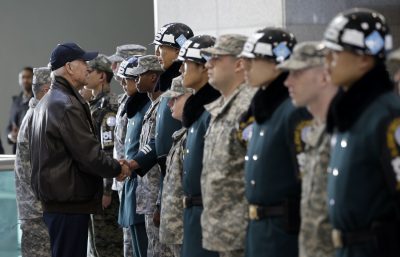
In his first visit to the State Department since taking office, President Joe Biden made two things very clear: first, that the presence of U.S. troops around the world will be undergoing intense review by his new administration, and second, that he has officially stopped the withdrawal of U.S. troops from Germany, ordered by the Donald Trump administration. The Trump administration had announced plans to relocate one-third of the 36,000 U.S. soldiers in Germany to other areas within the United States and Europe in July of last year, after Trump denounced Germany as a freeloader on U.S. security assistance for its failure to pay its share of NATO contributions. Biden, on the other hand, in formalizing his plans to stop this withdrawal, has revealed that he is approaching the issue of U.S. military presence abroad as a matter of security rather than one of financial interests.
The Trump administration had made an equally absurd demand regarding Korea’s mandatory share of the defense budget and had slyly hinted at the possibility of withdrawing troops from there in the case that those payments were not made. One such move indicating this was the United States’ statement at the South Korea-U.S. Security Consultative Meeting, which contained no mention of a decision to maintain the current total of 28,000 U.S. troops in Korea, and had already raised great concern in the country concerning national security. However, with Biden’s firm decision to halt the withdrawal of troops from Germany, it is highly likely that he will resolve issues regarding the presence of U.S. troops in Korea in a similar manner. Moreover, unlike Germany, South Korea has the important role of keeping North Korea and China in check, so it will be all the more imperative that U.S. troops be stationed there.
But we shouldn’t jump to conclusions yet because, as Biden announced, his administration has begun a massive review of the efficient deployment of troops around the world, and we cannot overlook the possibility of changes in the nature or status of the United States forces in Korea based on that. Even if the total number of deployed troops were to be maintained, the assigned location and distribution of troops may change depending on the new purpose they are to serve. The U.S. military has been steadily moving toward a policy of “strategic flexibility” that frequently borrows built-in power and inserts it into other battlefields. From the perspective of South Korea, this could provide an element of great insecurity for the country; therefore, it is crucial that the Korean government continues to work closely with the U.S. so that South Korea’s role in the new U.S. military policy will be reflected positively.
Finally, it is necessary to analyze how the review of U.S. troops’ global presence will affect pending issues such as the transition of wartime operational control and the continuation of South Korea-U.S. joint military drills. As the saying goes, “He who fails to prepare, prepares to fail”; there is no use in us regretting Korea’s past actions once an unfavorable decision is made by the U.S. To that extent, I believe we must remain alert and vigilant throughout this process and act in a way so as to not prepare ourselves for failure.

Leave a Reply
You must be logged in to post a comment.